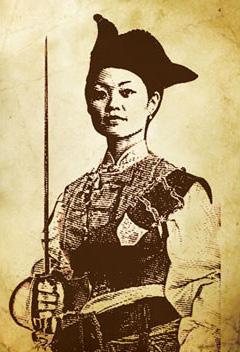
3 minute read
Madame Zheng: The Most Successful Pirate of all Times
Madame Zheng: The Most Successful Pirate of all Times by Tatyana Dimitrova
At the height of their power, infamous Carribean pirates we have all heard of like Blackbeard and Henry Morgan, had as many as ten ships and several hundred men. But their stories pale next to the story of the most successful pirate of all time: Madame Zheng. Yes! Isn’t it curious that history has erased that tiny little detail that the most terrorising pirate to ever exist was not a man, but actually a woman? Madame Zheng, born Shih Yang, commanded 1800 vessels, made enemies with several empires and still lived to old age. She began her life as a commoner, working on one of the many floating brothers, or flower boats, in the city of Guangzhou. By 1801, she had attracted the attention of a local pirate captain named Zheng Yi. The two soon married. Interestingly, Guangzhou’s fishermen had long engaged in small-scale piracy to supplement their income in the offseason. However, a peasant uprising in neighbouring Vietnam at the end of the 18th century had raised the stakes. Due to the ongoing maritime battles, Guangzhou’s pirates were commissioned to raid the Chinese coast. Zheng Yi came under Vietnamese patronage and this turned them from gangs aboard a single vessel, to professional privateer vleets with dozens of ships of their own.
Advertisement
In 1802, the pirates lost their patronage because their Vietnamese patrons were overthrown. Instead of scattering, the Zhengs met the crisis by uniting the rivaling Cantonese pirate groups into an alliance. At its heights, the confederation included 70 000 sailors with 800 large ships and nearly 1000 smaller vessels.
The Zhengs were unlike many other historically-known pirateers, who acted on behalf of various naval powers. Instead, they were true outlaws, operating without support or approval from any government. Sadly, Zheng Yi met his death in 1807. However, his widow Madame Zheng did not hesitate to secure their gains. Through skilful diplomacy, she took charge of the confederation. Meanwhile, she appointed her late husband’s young protege, Zhang Bao, as the commander of her most powerful squadron. He became not only her right hand, but her lover, and soon her new husband. Madame Zheng consolidated her power through strict military discipline, combined with a progressive code of laws. Under her leadership, female captives were theoretically protected from sexual assault. While pirates could take them as wives, mistreatment towards them was punishable by death. In addition to that, the pirates greatly increased their power. Within a few years, they destroyed 63 of Guangdong Province’s 135 military vessels, forcing the military commanders to hire more than 30 private ships.
Madame Zheng was so feared that Chinese commanders charged with apprehending her spent most of their time ashore and sometimes even sabotaging their own vessels to avoid battle at sea. Using her administrative talents, Madame Zheng established financial offices in cities and villages, allowing her pirates to extract regular protection payments on land and sea alike. This effectively created a state within a state whose

influence reached far beyond the South China Sea. At the peak of her power, Madame Zheng’s confederation drove five American ships to safe harbour near Macao, captured a Portuguese ship and blockaded a tribute mission from Thailand - all in a single day.
Perhaps Madame Zheng’s greatest success was knowing when to quit. By 1810, her confederation was weakened because of conflicts from within and made it more vulnerable to attacks. When the Chinese government, which was desperate to stop the raids, offered amnesty in exchange for the pirate’s surrender, Madame Zheng

agreed, but only on her own terms. Her husband Zheng Bao was allowed to retain 120 ships for personal use and became an officer in the Chinese navy. Fighting pirates himself, he quickly rose in the ranks of the military command. Madame Zheng, on the other hand, enjoyed all the privileges of her husband’s status. After he died in 1822, Madame Zheng and her 11-year-old son returned to Guangzhou, where she opened a gambling house and quietly lived off the proceeds. She died at the age of 69 - an uncommonly peaceful end to a pirate’s life.










